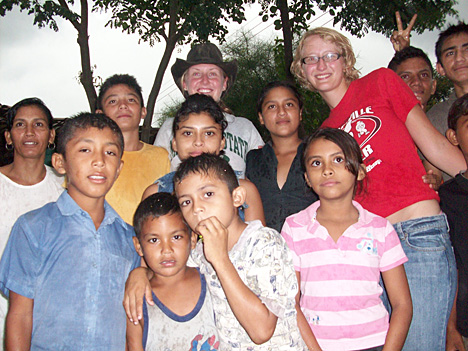The University of Toledo’s Engineers Without Borders student chapter has been granted $10,000 for another riverbank water filtration system in Honduras.

Erin Nichols, left, and Emma Boff, members of the UT Engineers Without Borders student chapter, posed for a photo with children during a visit to Honduras.
The Environmental Protection Agency hosts the P3 (People, Prosperity and the Planet) Awards each year to select and fund students’ project designs that will help create a sustainable future. The EPA P3 Awards are a two-phase team contest.
“We are already working on the project, thanks to the phase one grant, which allowed us to begin researching the water banks in Honduras and to begin designing our filtration system,” said Dr. Youngwoo Seo, UT assistant professor of civil engineering. “If we win the phase two award, which will grant us $75,000, we can actually begin implementing the plan. And because of the large sum of money, we will be able to help more villages and more people in Honduras on a larger scale.”
Engineers Without Borders went to Honduras to find out what exactly was contaminating the water and found heavy metals and pathogens, Seo said, adding that it was largely due to the fact that both the villagers and the animals were drinking and bathing from the same area of the river.
To solve the problem, the organization plans to build a riverbank water pipeline system, which is essentially a ditch about 50 feet away from the river that will allow the water to be naturally filtered through the ground. But to better ensure that as many contaminants are eliminated as possible, the group also will add a disinfection system, said Erin Nichols, president of UT Engineers Without Borders.
“It’s humbling and enlightening to see how hard the villagers work. They want this so badly that they are willing to do anything to help,” Nichols said. “They are very intelligent people. They just don’t have the same resources we do and that’s something we would like to provide for them.”
In April, Engineers Without Borders will present their plans and preliminary research and design results to a panel of judges in Washington, D.C.; of the 40 eligible teams, only five will be awarded the phase two grant.
“With just this small investment, we are going to make a big difference in these villages,” Seo said. “We are learning many things together, and we are hoping that other people will want to get involved.”
“Our goal as Engineers Without Borders is to create a better lifestyle for these people,” Nichols said. “We hope to get other departments on campus involved so that we can not only give them clean drinking water, but also provide them with health care, English lessons and even business plans.”
For more information on the project or Engineers Without Borders, visit www.eng.utoledo.edu/~ewob/home.htm.